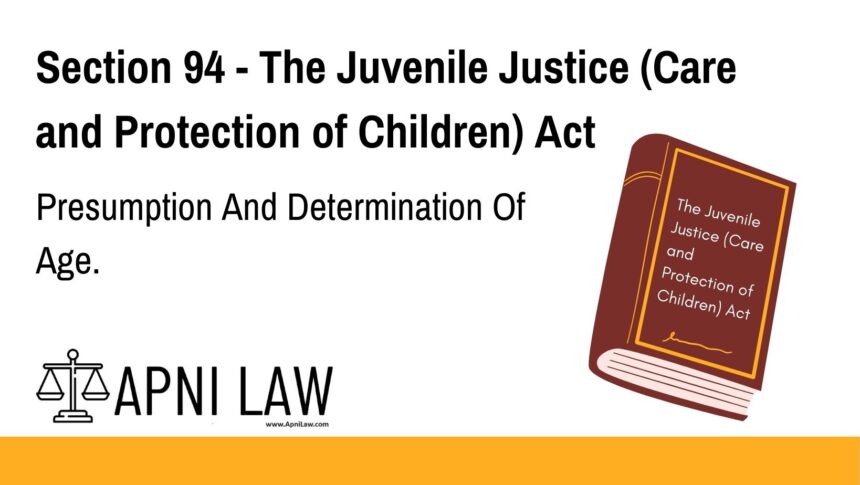Code: Section 94 of the Juvenile Justice (Care and Protection of Children) Act
94. Presumption and Determination of Age
(1) If the Committee or Board believes, based on the appearance of the person brought before it, that the person is a child, they will record this observation and proceed with the inquiry. They do this without waiting for further confirmation of the child’s age.
(2) If there is doubt about the person’s age, the Committee or Board must determine it. They can obtain evidence by:
(i) Requesting a birth certificate from the school or a matriculation certificate from the relevant examination board, if available;
(ii) Asking for a birth certificate from a municipal authority, corporation, or panchayat;
(iii) If neither of the above is available, the Committee or Board may order a medical age determination test, such as an ossification test.
Note: Any medical test ordered must be completed within 15 days of the Committee or Board’s order.
(3) The age recorded by the Committee or Board is considered the true age for the purposes of this Act.
Explanation of Section 94
This section ensures that the age of individuals involved in the Juvenile Justice Act is properly determined. It describes how the Committee or Board handles cases where there is doubt about the person’s age.
- Key Point 1: If the person’s age is obvious, the Committee or Board can proceed with the inquiry without waiting for verification.
- Key Point 2: If the person’s age is in question, the Committee or Board will seek documents like birth certificates. If unavailable, they may order a medical test.
- Key Point 3: The age determined by the Committee or Board is final.
Illustration
Example 1: Apparent Age
A person is brought to the Committee for an inquiry. Based on their appearance, it is clear that they are a child. The Committee records the child’s age and proceeds with the inquiry.
Example 2: Doubt About Age
The Board is unsure about the age of a person brought for an inquiry. The Board asks for a school or municipal birth certificate. If those are unavailable, the Board orders an ossification test.
Common Questions and Answers on Section 94
1. What happens if the Committee or Board is unsure about someone’s age?
- Answer: If the Committee or Board doubts the person’s age, they will request documents like a school or birth certificate. If these are unavailable, they may order a medical test.
2. How quickly must the medical test be completed?
- Answer: The medical test must be completed within 15 days of the Committee’s or Board’s order.
3. Is the age recorded by the Committee or Board final?
- Answer: Yes, the Committee’s or Board’s recorded age is considered final under this Act.
Conclusion
Section 94 provides clear guidelines for determining the age of a person involved in the Juvenile Justice Act. It ensures that children are identified correctly and receive the protections they are entitled to under the law.








